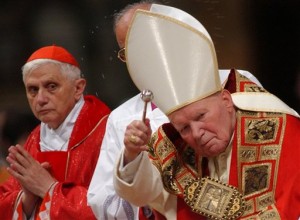Pope avoids predecessor’s show of suffering

In this file photo taken Sept. 11, 2002, then Cardinal Joseph Ratzinger of Germany, left, now Pope Benedict XVI, looks on as late Pope John Paul II celebrates Mass in St. Peter’s Basilica at the Vatican. The closest of confidants, Cardinal Ratzinger watched from the front row as that late, once a strapping athlete, steadily deteriorated in his later years. AP PHOTO/PIER PAOLO CITO
VATICAN CITY—The closest of confidants, Cardinal Joseph Ratzinger, watched from the front row as Pope John Paul II, once a strapping athlete, steadily deteriorated in his later years.
John Paul, burdened by Parkinson’s disease and crippling hip ailments, could no longer walk or talk at the time of his death in 2005 at 84—a picture of suffering that moved the faithful while presenting a disturbing vision of papal frailty. The physical ordeal also left John Paul distracted from the challenges the Church was facing, including the global priest sex abuse scandal.
Ratzinger, elected as Pope Benedict XVI, was at 78 the oldest pope in 300 years. With his resignation, it is clear that he has sought to spare the Church another agonizing end—and, in the process, perhaps help the Church keep pace with the realities of modern-day medicine.
In his announcement, Benedict said his strength in recent months “has deteriorated in me to the extent that I have had to recognize my incapacity to adequately fulfill the ministry entrusted to me.”
In the Church, bishops are forced to resign at the age of 75, and cardinals over 80 are barred from voting in a conclave to elect a new pope. It’s only popes who are expected to rule for life. Now, the first papal resignation in 600 years could help set a modern precedent ensuring that popes, like other leaders with crushing responsibilities, have the mental and physical vigor to carry out the job.
Article continues after this advertisementParis Cardinal Andre Vingt-Trois said Benedict “broke a taboo.”
Article continues after this advertisement“He broke away from several centuries of practice,” the cardinal said, “and expressed the view that it wasn’t just legitimate but probably useful for a pope to renounce and withdraw from his duties.”
“In any event, it’s a liberating act for the future … For the century to come I think that none of Benedict XVI’s successors will feel morally obliged to remain until their death,” the French prelate said.
Milan Cardinal Angelo Scola, considered a top candidate to succeed Benedict, endorsed that view. “It is, as he said, for the good of the Church,” said Scola—although at age 71, he, too, would be an elderly pontiff if elected.
An examination of Benedict’s thinking makes the decision less of a surprise.
Back in 2004, then Cardinal Ratzinger said he would not rule out term limits in the future. In an interview with an Italian religious affairs magazine, he said that with people living longer “one also could consider new norms.”
Then, in a 2010 interview with German journalist Peter Sewald, Benedict took an unambiguous stand on whether a pope could resign.
“Yes. If a pope clearly realizes that he is no longer physically, psychologically and spiritually capable of handling the duties of his office, then he has a right and, under some circumstances, also an obligation to resign,” Benedict said.
Gunther Simmermacher, who has been editor for decades of the Southern Cross, a Catholic magazine published in South Africa, said that while Benedict has hinted at such a possibility, the news came as a surprise “even for people ensconced at the Vatican.”
He recounted speaking by phone Monday morning with an official in the Vatican, and “having pleasant small talk with not a hint of this (resignation).”
The Rev. Thomas Reese, a Vatican expert, said that most modern popes have felt that resignation is unacceptable. Although church law has long accepted the possibility, popes fear setting precedents that could encourage factions to pressure for resignations for reasons other than health.
Pope Paul VI, pontiff from 1963 until his death in 1978, summed up the view now being challenged by Benedict by famously saying: “Paternity cannot be resigned.”—With Michelle Faul in South Africa, and Thomas Adamson in Paris